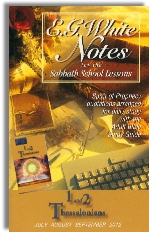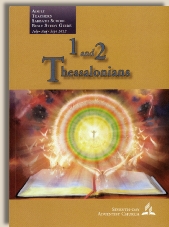|
||||||||||||||
Commentary on "Preserving Relationships"
Day 5: Wednesday, July 11, 2012 - Arrival in Corinth
Overview
Today’s lesson looks at Paul’s arrival in Corinth and concludes that “Paul must not have been satisfied with the outcome of his encounter with the philosophers of Athens, for in Corinth he decides to take a more direct approach to the Greek mind. In doing so, he does not reject the idea of ‘meeting people where they are,’ for he clearly promotes such an approach in the same letter (1Cor. 9:19-23).”
Paulien further says that meeting where they are is not an “exact science” but “requires constant learning and adjustment.” Paul, he says, did not take the same approach in every city but was sensitive to changing times, cultures, and circumstances.
Observations
The text for the day’s lesson is 1 Corinthians 1:18-2:2:
For the word of the cross is folly to those who are perishing, but to us who are being saved it is the power of God. For it is written,
“I will destroy the wisdom of the wise, and the discernment of the discerning I will thwart.”
Where is the one who is wise? Where is the scribe? Where is the debater of this age? Has not God made foolish the wisdom of the world? For since, in the wisdom of God, the world did not know God through wisdom, it pleased God through the folly of what we preach to save those who believe. For Jews demand signs and Greeks seek wisdom, but we preach Christ crucified, a stumbling block to Jews and folly to Gentiles, but to those who are called, both Jews and Greeks, Christ the power of God and the wisdom of God. For the foolishness of God is wiser than men, and the weakness of God is stronger than men.
For consider your calling, brothers: not many of you were wise according to worldly standards, not many were powerful, not many were of noble birth. But God chose what is foolish in the world to shame the wise; God chose what is weak in the world to shame the strong; God chose what is low and despised in the world, even things that are not, to bring to nothing things that are, so that no human being might boast in the presence of God. And because of him you are in Christ Jesus, who became to us wisdom from God, righteousness and sanctification and redemption, so that, as it is written, “Let the one who boasts, boast in the Lord.”
And I, when I came to you, brothers, did not come proclaiming to you the testimony of God with lofty speech or wisdom. For I decided to know nothing among you except Jesus Christ and him crucified.
The lesson asks what we learn from these verses about Paul’s missionary strategies in Athens and Corinth. The question, however, is the wrong question. This passage is not about strategy, nor is there any indication that Paul was unhappy with the response of the Athenians.
This passage in 1 Corinthians is a clear exposition of reality. Paul explains that the self-righteous religious and the arrogant secularists were equally offended by the cross of the Lord Jesus. It is a stumbling block to Jews and a folly to the secular gentiles, and Paul is stating that this offensive cross and the Christ who died on it is the one Thing everyone needs.
Paul admits that Christ crucified, the “foolishness” the Greeks despised, is wiser than men, and God chose Jesus and the cross to shame the wise; He chose the “weak in the world to shame the strong.”
This Jesus became to those who believe wisdom from God, righteousness and sanctification and redemption. He did not just bear these gifts; He Himself IS the gift. He IS wisdom, righteousness, sanctification, and redemption.
We who are in Christ can boast in only one thing: the Lord, and Paul stated definitely that he would know nothing among the Corinthians except Christ and Him crucified.
This passage is not demonstrating a changing evangelistic approach. Rather Paul is declaring the one and only topic of his life of evangelism: Jesus—who died, was buried, and rose on the third day. This Jesus is God’s wisdom and the one and only way men and women may be saved.
This week’s lessons are contrived to make points about Adventist evangelistic techniques that are not supported in the Scriptures. Again, the point of 1 and 2 Thessalonians has nothing to do with making relationships to ensure new converts will not leave by the back door.
Summary
- There is no suggestion in Scripture that Paul was dissatisfied with the outcome of his preaching in Athens—at least there is no suggestion that he felt he needed to use a different strategy.
- Scripture does not teach “strategies” for evangelism. Rather, Scripture declares the truth and show us how Paul preached to Jews and Greeks alike by declaring the Lord Jesus and His death, burial, and resurrection. His message was always the same.
- 1 Corinthians 1 is a statement of the offense of Jesus and the cross to unbelievers, whether they are religious or secular.
- Paul states that this offense, Jesus Himself, is nevertheless God’s wisdom and power, and He shames the wise and strong of the world.
- Paul only preaches on thing: Jesus and His atoning death, burial, and resurrection.
- This week’s lessons about building relationships to cement new converts into Adventism is never addressed in Scripture. The substance of true evangelism is the Lord Jesus, not strategies for relating to people in a way to secure their loyalty.
Copyright 2012 BibleStudiesForAdventists.com. All rights reserved. Revised July 10, 2012. This website is published by Life Assurance Ministries, Camp Verde, Arizona, USA, the publisher of Proclamation! Magazine. Contact email: BibleStudiesForAdventists@gmail.com.
The Sabbath School Bible Study Guide and the corresponding E.G. White Notes are published by Pacific Press Publishing Association, which is owned and operated by the Seventh-day Adventist church. The current quarter's editions are pictured above.
Official Adventist Resources
Standard Edition Study Guide Week 2
Teacher's Edition Study Guide Week 2
Easy Reading Edition Study Guide Wk 2
Search the Complete Published Ellen G. White Writings
Please Support This Project


